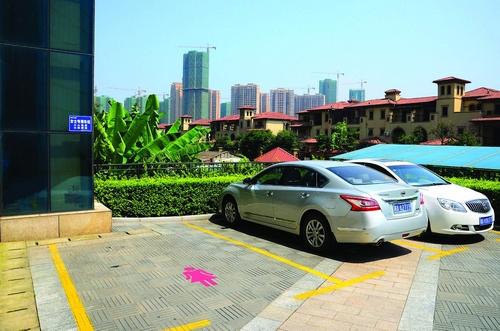当前位置: Language Tips> 双语新闻
China: Plus-sized parking spaces introduced because 'women can't drive'

|
The parking spaces outside a Chinese shopping mall are distinctive: marked out in pink, signposted "Respectfully reserved for women", and around 30 centimetres wider than normal. The slots at the Dashijiedaduhui -- or "World Metropolis" -- centre have sparked debate in China, which officially embraces gender equality but where old-fashioned sexism is rife in reality. The mall, in the centre of the northern port city of Dalian, has little to distinguish itself from thousands of other retail complexes that have sprouted across the country as part of a vast urbanisation drive. It boasts chain clothing stores, fast food franchises, glass lifts, a cinema and the inevitable Starbucks, a favourite hangout of China's new middle class. Unusually, though, the 10 spaces outside the main entrance were provided after women had trouble parking in the standard basement slots, managers said. "I think this is very convenient," said user Yong Mei. "Other parking spaces are too narrow." "It's not gender biased," she told AFP. "It's just that women have a few issues with vision when parking." But outraged commentators on Chinese social media accused the mall managers of sexism and cliched thinking. "This is supposed to respect women, but actually it's an insult," said one. The mall managers deny the allegation. "We just wanted to make things easier for women, who make up most of our customers," said Yang Hongjun, a woman herself. "It's not an insult to women at all," she added. "If their parking spaces are larger, it's only for practical reasons. It doesn't mean that women drive less well than men." 'Men who cook and women who drive' One online poster on the Dalian car park said: "The two most dangerous things in the world are men who cook and women who drive." Manufacturers' advertisements in the world's biggest auto market are invariably aimed at male buyers, and a man at the mall, Wu Zhicun, said: "Women don't really know how to park a car." "The few times I've come close to crashing was basically with women driving the other car," he added. "I've noticed they're a bit rough at the wheel, they only look forwards, too often they ignore their mirrors." But driving standards in China are often lamentable, regardless of which gender is at the wheel. According to state media reports, officials said 60,000 people died on the roads in 2012, the most recent figures available. The parking initiative is not unprecedented -- other countries have similar female-dedicated spaces, including South Korea and various European nations. The latest Chinese controversy echoes a series of microblog posts Beijing police made last year advising women on driving techniques -- including not wearing high heels, releasing the handbrake before setting off, and not panicking if they suddenly realise they're going the wrong way. "Some women drivers lack a sense of direction, and while driving a car, they often hesitate and are indecisive about which road they should take," reads one of the entries on the police department's verified microblog. Another featured a cartoon depicting a confrontation between a police officer and a woman driving a vehicle shaped like a large red high-heel shoe. According to a World Health Organization estimate in March 2013, globally males are more likely to be involved in accidents than females, and 77% of all road traffic deaths occur among men. Even so, for some posters the Dalian parking places amounted to discrimination against male drivers. "It's always women who enjoy privileges!" complained one. "Men have become the weaker sex. |
据《印度斯坦时报》报道,中国一商场前出现与众不同的粉红色停车位,并标有“女士尊享”四个大字,比一般的停车位宽30厘米左右。 大连市大世界都会商城推出的这一女性专用停车位在国内引发热议,虽然中国官员强调男女平等,但在现实生活中,陈腐的性别歧视却普遍存在。 随着中国城镇化进程大规模推进,全国各地的大型商场如雨后春笋搬拔地而起。该商场在港口城市大连的北部,和其他数千家大型百货公司一样拥有服装品牌、快餐店,观光电梯,电影院和不可或缺又深受中国新兴中产阶级喜爱的星巴克。 经理介绍说,尽管不常见,公司在发现女性在地下标准停车位遇到问题后便在商场的主要出口外提供10个女性专用停车位。 顾客永梅(音译)表示:“我认为这很方便。其他的车位太窄了。” 她告诉法新社“这并不是性别偏见,只是女性在停车时会有时会不注意看。” 但中国社交媒体上的大多数网名纷纷指责,该商场的经理性别歧视,思想陈腐。 一位网民写道:“这看似是在尊重女性,其实是种侮辱。” 女经理杨红君(音译)解释说:“女性是我们的主要消费者,我们只是想为他们提供更多的便利。” 她补充道:“这完全不是侮辱。为女性提供更宽大的停车位也是出于实用性考虑。这并不表示女性车技不如男性好。” “下厨的男人和开车的女人” 网上一条评论说道:“世界上最危险的是下厨的男人和开车的女人。” 汽车厂商在全球最大汽车市场做的广告也始终锁定男性消费者。商场的一位男性顾客吴志存(音译)表示:“女性不是真的知道如何停车”。 他补充道:“他仅有的几次险些撞车经历,对方车主都是女性。我发现她们有点粗心,只顾看前方,经常忽略了看倒车镜。” 然而不论司机是男还是女,在中国的驾驶标准往往令人悲叹。根据中国官方媒体报道称,2012年共有6万人死于道路交通事故,这是目前所知的最新数据。 设置女性专用车位并非大连首创,韩国和一些欧洲国家之前已经推出此项服务。 最近一次在中国引发有关女性开车热议的事件是去年北京交警发表博文指导女性开车,其中的建议包括:不要穿高跟鞋开车;开车前勿忘放手刹;走错路莫惊慌。 新浪认证为北京市公安局官方微博的账号写道:“有些女司机缺乏方向感,在驾车的过程中经常对路径的选择犹豫不决。” 另一条博文中则上传了一个卡通图片,图中展示了一名警察正在和一名开着“巨型红色高跟鞋”形状汽车的女司机对峙。 世界卫生组织2013年3月公布的统计表明,全球范围而言,男性比女性更容易卷入交通事故中,男性占道路交通事故死亡总数的77%。尽管如此,大连一些抗议女性专用停车位的人看来,设置女性停车位是一种歧视男性的行为。 其中一人抱怨:“女性总是享有特权,男性已成为弱势性别群体。” 扫一扫,关注微博微信
  (译者 losalina 编辑 齐磊) |
上一篇 : 应对最刁钻面试问题的18个机智回答
下一篇 : 日本进入智能手机和“低头走路”时代
关注和订阅


电话:8610-84883645
传真:8610-84883500
Email: languagetips@chinadaily.com.cn